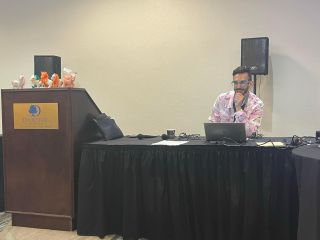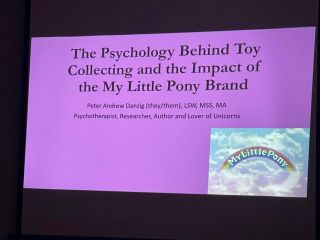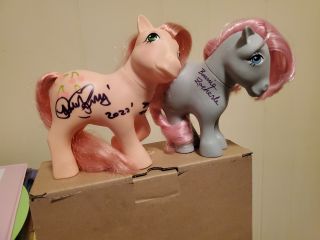Career
Geek Therapy Heroes Walk Among Us
The psychological impacts of being heard and affirmed.
Posted July 17, 2023 Reviewed by Gary Drevitch

Welcome to my blog, Don’t Toy with Me: How Geek, Pop, and Material Culture Impact our Resilience and Mental Health. I think it fitting to start with a relational story. As a Geek Psychotherapist, there’s a variety of interpretations to our clinical work and the intersections with mental health and psychopathology. However, most importantly, as in most clinical work, our ability as humans to be seen, heard, and affirmed is at the core of my clinical work. For some level-setting on my practice, toys and forms of play and their impacts over the life-span represent the foundation of the relational aspects of geek therapy.
And so I found myself at Pony Fair 2022, in Tampa, Florida, for the final My Little Pony Fair presentation on The Psychology Behind Toy Collecting and the Impact of the My Little Pony Brand.
Among the presenters and special guests were Bonnie Zacherle, creator of My Little Pony in 1983; Allison Boisselle, original illustrator for the toy line; and Kirk Hindman, industrial designer and sculptor of some of the original poses for the toy line. And then, there was me, a psychotherapist navigating how this, and many other forms of play shifted the sense of self and psychological well-being for many children in the 1980s and 90s, and also, as adults, today. I presented on the ways that play is stunted over the lifespan to be replaced by luxury vacations, material comforts, and a cultural pressure to leave childhood play as a nostalgic experience in the past. My argument is that there is immense healing and affirmation in allowing ourselves to collect, display, and even at times play with those toys that brought us comfort as children. Our inner child may find delight and safety in waking up and seeing their collection. As a 39-year-old clinician, I’m unapologetic about my waiting-room décor. You’ll find toys, books, and pop-culture memorabilia from as early as the 1950s through today. Often, patients will find something that catches their interest, and in session, we find during moments of pain a story that allows them to share their inner experience. The theoretical model of dopamine decor is a pop-culture phenomenon now but has been in practice for clinicians and collectors alike for decades. In material culture, from these small pastel equines, we found solidarity.
After my presentation, and reading of a chapter from my upcoming book, there was a scheduled meet and greet, yet I barely made it out of the presentation room as people of all intersections and experiences formed a line to share their stories of resilience, happiness, pain, and associated experiences with My Little Pony. The takeaway was that they had language for their reasoning for collecting even as they were often shunned or criticized for not embracing more “adult” forms of expression. I stayed, listening to each interaction, humbly thanking them for their share of vulnerability.

At the end of the day, one relational aspect was clear: These toys and play in general saved lives and helped all of us find meaning in our daily experiences. Clinically, there is no greater satisfaction than the notion of finding self-acceptance. My own inner child, a LatinX, Gender Queer person and trauma survivor, felt a sense of communitas. These toys saved my life, too. (For a glimpse into that story, see my previous guest post here.)
As I prepared to enter the collectors' showroom and do signings I found myself taking a moment of pause. I never imagined I’d share space with some of my own heroes. Each special guest contributed to creating a toy that shaped my childhood, and now a personal collection that inspires me daily. A sense of imposter syndrome set in; how did my research on material culture and toy analysis fit in here? My training and road to clinical work was so different from that of my colleagues, and often considered radically out of the box, and yet here I was, prepping to meet the many people who left my presentation, standing-room only, with yet more peeking into the doorway to hear the psychology behind their favorite toy.
As I walk toward the hall, a young person stops me and asks if they can say hello. They weren’t so much a collector as a person who had read my articles and found themselves seen for the first time in clinical literature. They were a self-identified geek who had traveled far to see my presentation and hopefully meet. They shared their own trials and tribulations as a psychology major whose ideas were often considered different, out of the box, and non-traditional. They had purchased Cherries Jubilee, a My Little Pony that was the center of one of my articles on queer-affirming experiences as a child. At the moment, I didn’t see just a future clinician, or a radical human; I saw a modern-day hero. Because, here, in this moment, I realized there as we stood together in the hallway that in the future, clinicians will continue to be brave and daring in their approaches to mental-health support. It was also there that my inner child felt seen, heard, and affirmed. I knelt, and signed their pony, but I also knelt down as a form of gratitude for the affirmative care that future clinicians would provide their clients.
One year later, I’m thrilled and honored to have this space to share my research, work from my upcoming book, and the impacts of geek and pop culture in psychology. Today, I can look over at my shelf, and see a signed My Little Pony from Bonnie Zacherle, and next to it, one signed by myself, which was given to me by one of the attendees who had me sign two: one for themselves, and one for the geek therapist whose articles helped them share their own stories. I’m thrilled and proud to look over and be reminded that in meeting my heroes, the creators, I was also venturing into meeting future heroes in our field, building on our research. That moment in the hallway gave me the energy to walk into the meet-and-greet and say thank you to the many people who let my ideas take space in their lives and thoughts.

I’m grateful.
References
"Relational Therapy," Psychology Today.
"The Rediscovery of Cherries Jubilee," Psychology Today. A queer metaphor for material culture and psychological safety by Peter Andrew Danzig.
“Dopamine Decor May Be the Secret to Your Happiest Home Yet," Better Homes & Gardens.


